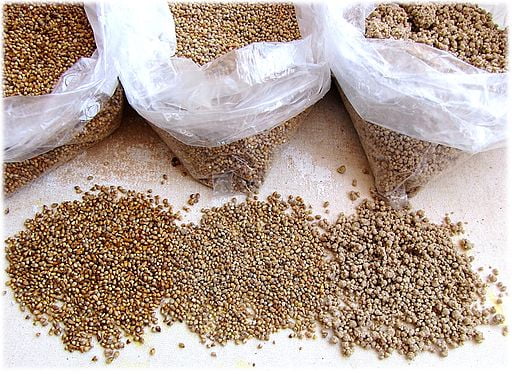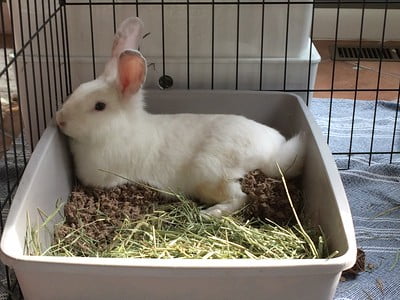Last Updated on March 14, 2023 by Marjon Ramos
Rabbits are silent animals, which has the downside of making it harder for rabbit owners to spot if they are unwell or stressed. Spotting the signs that your rabbit is stressed is an important skill to have as a rabbit owner.
You can tell if your rabbits are stressed by looking for symptoms like aggression, nervousness, lethargy, over-or not-grooming, and lack of appetite.
If you notice any of these behaviors in your rabbits, it’s important to consult a veterinarian so that they can check if there are any underlying conditions causing them.
Now that I’ve given you the gist of the article, read on as I explain in more detail how you can tell if your rabbit is stressed:
Table of Contents
What are the signs that your rabbit is stressed?
Rabbits that are stressed are prone to all kinds of digestive problems that can be fatal if not treated immediately.
That’s why it’s important that you know its signs so that you can quickly solve whatever it is that’s causing stress to your rabbit.
Here are the most common signs of a stressed rabbit:
1. Aggressiveness
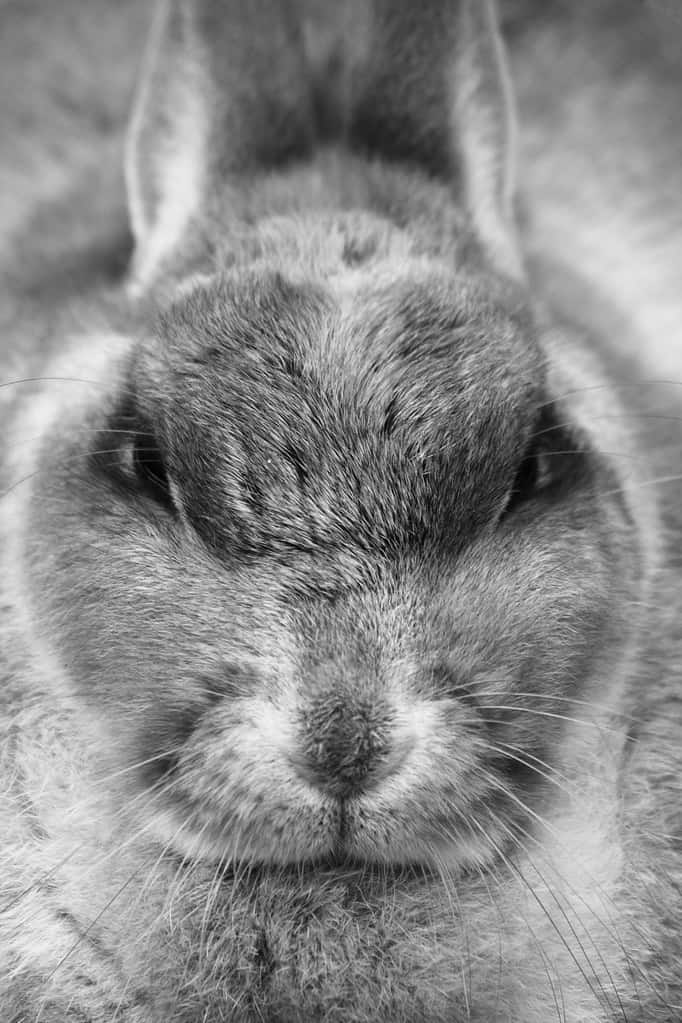
Rabbits are not aggressive towards people or other rabbits without a reason. One possible sign that your rabbit is stressed by its current situation is aggression towards you or their rabbit companion.
One of the most common reasons why a rabbit suddenly becomes aggressive towards its owners is boredom. Rabbits are naturally curious animals, and they require lots of stimuli to be happy.
In the wild, rabbits have the whole forest to wander and explore, so they always have something to do. So if your rabbit is always in its cage with no toys or exercise, it could lead to stress and aggressive behaviors.
Solution
If this is the case for your rabbits, make sure that your rabbit’s cage or hutch is large enough for them to stand and move around. Your rabbit also requires at least four hours of exercise where they can wander and explore.
Also, provide your rabbits with toys to help ease the boredom. The best rabbit toys are those that they can chew on, like apple sticks.
2. Nervousness

Nervousness is also a sign of stress. A nervous rabbit is usually an indication of past trauma or distrust of its owners.
Here are the signs that your rabbit might be nervous around you:
- Flat ears. Just like dogs and other animals, a rabbit’s ear is a good indication of what your rabbit is feeling.
- They freeze and stare at you.
- Running away from you and hiding.
- No nose twitching while staring at you. Nervous rabbits would tense up and stop any unnecessary movement, like nose twitching.
If your rabbit is nervous around you or with anyone, you need to be patient with them and provide as much comfort as possible.
Nervousness and distrust could indicate that they have been abused in the past, especially if your rabbit is a rescue.
Solution
Here are the things you need to do to make your rabbit trust you:
- Give your rabbit the space they need. If your rabbit doesn’t want to play or socialize with you, be patient and just let them do whatever they want.
- Prove all their basic necessities. Your rabbit should have access to food and water at all times. Their cage/hut should be big enough for them to stand and walk around.
- Give treats occasionally. Treats are the best way for your rabbit to trust you. Rabbits are suckers for sweet treats. The downside is that you can only give your rabbits small amounts of treats per day, so you need to be patient.
- Don’t lift your rabbit. In the wild, once a rabbit is “lifted up,” it usually means death. That’s why rabbits would do all they could to avoid getting lifted up. Lifting your rabbit would just prolong the bonding process.
- Give pets. Pet your rabbit whenever it comes to you on its own.
- Don’t make any loud noises. Loud noises scare your rabbit more than anything else. You should limit yourself to making any loud noises, especially at the start of your relationship.
3. Over-grooming/not grooming
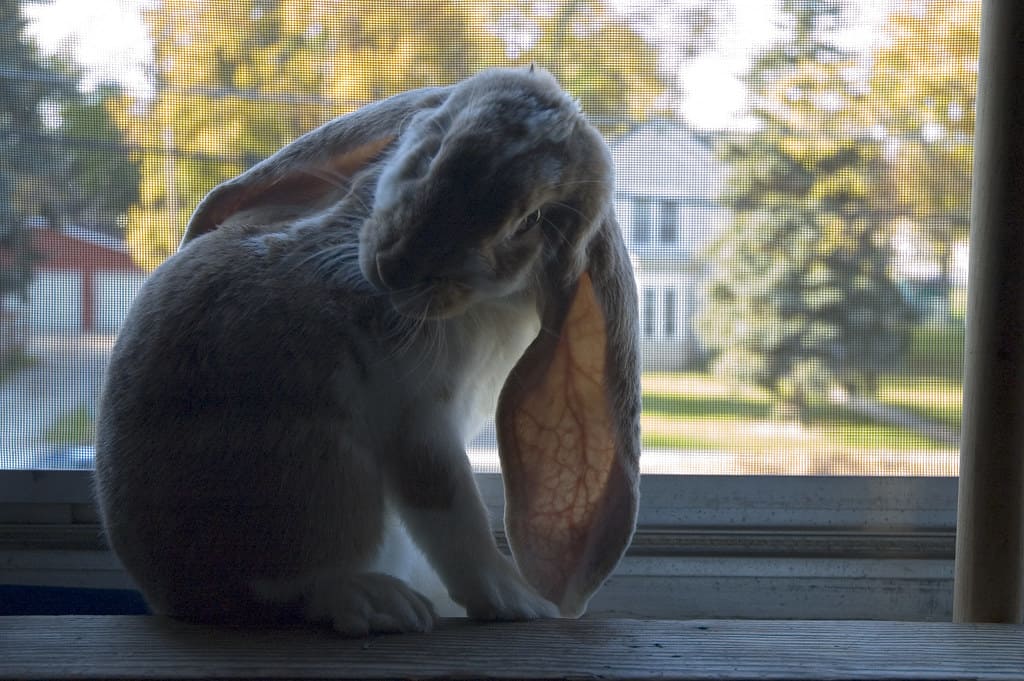
Over grooming or not grooming is also a sign that your rabbit might be stressed and bored with its current lifestyle. The problem with your rabbit’s overgrooming is that their skin could get inflamed and could cause patches of hair to be lost.
If your rabbit is over grooming or not grooming, you need to look for the cause. Here are the causes of stress in rabbits:
- No exercise. Rabbits are not meant to be confined in cages all day. The best possible environment for rabbits is the one that they have in the wild, which means lots of exercise and stimuli.
- New environment. Changes in their environment could also cause stress to rabbits because they are territorial and they don’t like changing environments.
- Being lifted up. Lifting a rabbit up causes stress to rabbits because, instinctively, in the wild, once a rabbit is “lifted up,” usually by a predator‘s mouth, it means death.
- Sickness or pain. A sick or in-pain rabbit could also cause overgrooming and stress. The usual suspects are mange and ticks. If you notice any odd behaviors, patches, or changes in your rabbit’s skin, bring them to a veterinarian for proper guidance.
Solution
Make sure that your rabbit is getting at least four hours of exercise. Let your rabbit out of their cage/hut to run around freely for 4 hours a day.
When changing environments, just make sure that you’re there for your rabbit when they need you. Just having you around would ease your rabbit’s worries.
If you suspect that your rabbit might be suffering from ticks or mange, bring your rabbit to a veterinarian for proper advice.
4. Lack of appetite and lethargy
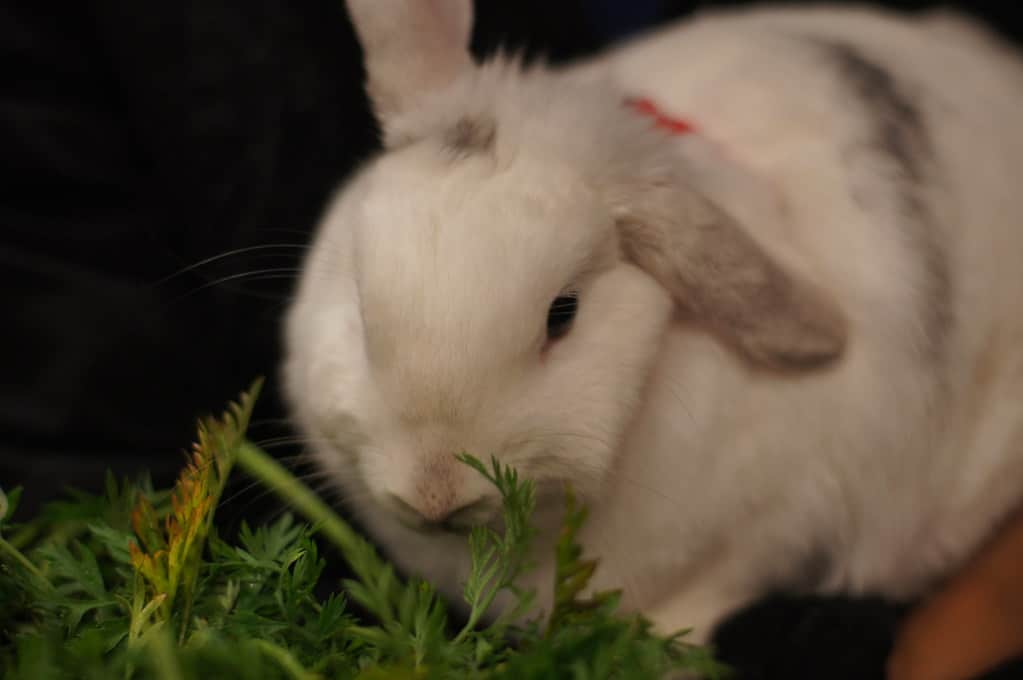
The most dangerous symptom of stress is a lack of appetite. Rabbits that are not eating enough fiber would eventually develop GI stasis, which could lead to organ failure and death.
Solution
If you notice that your rabbit is not eating, immediately bring your rabbit to a veterinarian because GI stasis is fatal extremely fast.
How do you calm a stressed rabbit?
In order to calm down your stressed rabbit, you must first carefully know what caused it in the first place.
Here are the most common causes of stress in rabbits and what to do about it to calm your rabbit down:
- Small living space. Rabbits can’t be caged in a small cage all day because they are made to wander in the wild. Rabbit experts agree that the best possible way to care for a rabbit is to mimic what they do in the wild. Wild rabbits are wonderers. If possible, don’t cage your rabbit and let them free roam around your house (rabbit-proof your house first!).
- Lack of exercise. As mentioned above, rabbits need exercise to be truly happy. If you really can’t let your rabbit free roam, at least let him exercise for a few hours every day.
- Lack of companion (another rabbit). Rabbits are social animals. In the wild, they live in small burrows underground, socializing with each other for hours. That’s why it’s often recommended that you get two rabbits so that if you are gone, they can keep each other company.
- Loud sounds (fireworks, loud machinery, etc.). Stressful noises like barking dogs, fireworks, and loud machinery can also stress your rabbit. If you live in an area prone to loud sounds or you’re expecting them, you can try closing all the windows, putting up thick blankets on the curtain rods, playing white noise to muffle the sound, or moving your rabbit to a new room.
- Close to a predator (dogs, cats, etc…). Rabbits are prey animals, so it’s only natural for them to be stressed whenever they are close to a predator. If your rabbit is stressed by your dog or cat, you need to separate them temporarily until your rabbit is so accustomed to the smell of your other pet that it doesn’t bother them anymore.
- Improper or frequent handling (e.g., picking up the wrong way). Another common reason that stresses a rabbit is when they are frequently picked up or when they are picked up the wrong way. Rabbits hate being picked up. And they even hate it more when the person picks them up the wrong way. Avoid picking up your rabbit if your rabbit is new (it does trust you yet) or if you don’t know how to properly do it. Here’s a great guide on how to properly pick up your rabbit.
- Sudden changes in their surroundings. Rabbits are creatures of habit because they rely on familiarity to quickly spot if what they see is a danger to them. Any frequent and sudden changes in their environment would cause stress. Avoid frequent changes in their space (hutch).
Summary
Symptoms of stress in rabbits include sudden aggressiveness, nervousness, over grooming or not grooming, lack of appetite, and lethargy.
Aggression in rabbits is usually caused by boredom or being kept in their cages for long periods of time without getting exercise. Rabbits are not meant to be kept in small cages all day.
The best environment for rabbits is the one that mimics what they have in the wild. They need constant exercise and stimuli.
Nervousness is usually caused by a lack of trust in their owners or past trauma. You can tell that a rabbit is nervous around you when they suddenly get tense and their ears are down.
The only thing you can do for a nervous rabbit is to be patient and earn their trust.
Overgrooming and not grooming is also a sign of boredom. If your rabbit is showing this behavior, you need to stop it immediately because it could lead to skin inflammation and loss of fur.
Lack of appetite should be looked at by a veterinarian because it could lead to GI stasis, which is dangerous and could be fatal extremely fast.
Cite this article:
Sources and further reading
- Buseth, Marit Emilie., and Richard A. Saunders. Rabbit Behaviour, Health, and Care. CABI, 2014.
- Lebas, F. The Rabbit: Husbandry, Health, and Production. Food and Agriculture Organization of the United Nations, 1997.
- Patry, Karen, et al. The Rabbit-Raising Problem Solver: Your Questions Answered about Housing, Feeding, Behavior, Health Care, Breeding, and Kindling. Storey Publishing, 2014.
- Overgrooming
- Rabbit’s body language

